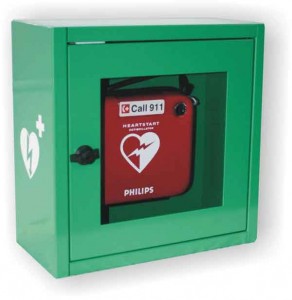A man in Japan says he was questioned by police and branded a “pervert” after providing emergency medical assistance to a stranger. The man was attending to a woman who had been involved in a traffic accident when he believes someone who saw him cutting through the woman’s clothes to apply a defibrillator to her bare chest called the police and reported him for behaving inappropriately.
An Automated External Defibrillator (AED) analyses the rhythm of the heart and, if necessary, delivers an electrical shock to help it return to normal. AEDs are provided in public places and are designed to be operated by members of the public, even those with no medical background. The man is now calling for better understanding of the correct use of AEDs.
In a series of posts on Twitter earlier this month, the unnamed Japanese man described the incident, which he says occurred three years ago. He happened upon the scene of a traffic accident in which the driver was not seriously injured, but a female passenger was unconscious and he could not detect a pulse. The man began to administer artificial respiration and CPR to the woman, and contacted the emergency services. After an AED was procured from a nearby convenience store, the man began to cut through the woman’s clothes in order to administer it.
An AED, which applies an electric shock to a patient suffering cardiac arrest, requires direct contact between the pads and the skin. Any clothing which is in the way must be removed.
However, when the man started to use the scissors, which were included in the AED’s box, to cut through the woman’s clothes, the driver of the vehicle told him to stop, asking what he was doing and calling him “hentai” (pervert). At this time, he believes, the driver of the car contacted the police to report him as a “chikan” (sexual molester).
After the injured parties had been taken to hospital, the man who had administered the AED gave his account of the incident to police. He was then handed over to a separate police authority, who questioned him about the report they had received that he was acting inappropriately at the scene of the accident. Once the man explained that he had been cutting through the woman’s clothes in order to use the AED, he was not questioned any further.
The man was later informed that – thanks to his bravery and quick-thinking, not to mention correct use of the AED – the woman had survived. He also reported that he was offered a certificate of appreciation, which he declined. The Twitter user ends his story with this comment:
????AED??????????????????????????????????????????????????
“An AED is supposed to be applied directly to the skin. Because the electric current it produces is strong, the underwire of a bra could prove extremely dangerous [if not removed before using]. Please remember this.”
In Japan, as in other countries, AEDs are provided in public spaces such as shopping centres, schools and sports facilities. They are designed to be operated by members of the public who may not have received training, and their use is covered in first aid courses.
Time is of the essence in the event of a sudden cardiac arrest: after only three to five minutes, the patient can start to suffer irreversible brain damage. The Red Cross states that for each minute defibrillation is delayed, the chance of survival drops by 10 percent. Increased public awareness about where to find AEDs and how to use them, as well as increased provision of the devices, are therefore vital to reducing deaths from cardiac arrest.
It seems like this incident had a happy ending, but it seems that if the person who called the police – or indeed the police officers themselves – had known that it was necessary to remove clothing to use an AED, they wouldn’t have had to waste time interviewing someone who was acting entirely appropriately.






















